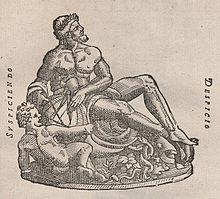Uranus
Uranos ( ancient Greek Οὐρανός Ouranós , German 'heavenly vault' , Latin Uranus, Coelus or Caelum ) represents heaven in the form of a god in Greek mythology and ruled the world in the first generation.
The first
Uranos is one of the Protogenoi , the oldest gods of the elements and the firstborn of Gaia (“earth”), whom she brought forth in her sleep without copulation by Eros , “that he always surrounds her and that he is the safe dwelling of the blessed gods for eternity ". With Uranos the male element came into the world.
Other sources claim a different origin of Uranos:
- Akmon ( Alkman fragment 61, Callimachos fragment 498). Accordingly, the nickname Akmonides ( Ἀκμωνίδης Akmōnídēs , German 'son of Akmon' , Latin Coelus Acmonides ) and with an etymological game on akámatos, Uranos becomes "the indefatigable"; see also the article Akmonides
- Aether and Gaia ( Titanomachia Fragment 2)
- Aether and Hemera ( Hyginus in his foreword and Cicero in his De Natura Deorum )
- Nyx (according to the Orphic hymns, Uranus was the son of the personified night)
The creation myth
With his mother Gaia, Uranos had many offspring: twelve Titans , three Cyclopes and three Hekatoncheirs . He hated all these children, he hid them in the depths of the earth, in Tartarus . This evil act pleased him, says Hesiod. And she angered Gaia, who thereupon produced the “gray steel” ( Adamas , the “indomitable”, metal not accessible to humans) in order to make a huge sickle out of it and instigated her sons to fight their father. Everyone was frightened. But the Titan Kronos finally agreed to take on this task, as Uranos was actually the first to commit a shameful act by locking his children up in Tartarus.
The next time Uranos wanted to unite with Gaia, Kronos emasculated him with this sickle. Uranus cursed the son who betrayed him that the same thing should happen to him and that he was betrayed by his own children. From the drops of blood that fell on the earth, Gaia gave birth to the three Furies ( Erinyes ), the giants and the Meliads (Meliai - the Melian nymphs - Ash nymphs - dryads ). Since then, the Erinyes have been pursuing every violation of maternal claims, even if these are not justified, but also every violation of a hierarchy that is caused by consanguinity.
From the seed of the severed genitals, which fell into the sea, Aphrodite arose , the oldest Olympic goddess . According to Homer , however, Aphrodite is the daughter of Zeus and Dione. Kronos took over the world until he was overthrown by his son Zeus.
With the story of the emasculation of Uranus, the spontaneous generation between heaven and earth in Greek mythology comes to an end; Uranus itself no longer plays a role in the further stories. The Titans are of the greatest importance from his descendants, as the later Olympian gods also descend from them .
Descendants
- with Gaia
- no direct mother
Pedigree of the Titans
| chaos | → | Gaia | → | Uranus | |||||||||||||||||||||||||||||||||||||||||||||
| Family of gods | of the titans | ||||||||||||||||||||||||||||||||||||||||||||||||
| Oceanus | Kreios | Hyperion | Theia | Themis | Phoibe | ||||||||||||||||||||||||||||||||||||||||||||
| Kronos | Koios | Iapetos | Rhea | Mnemosyne | Tethys | ||||||||||||||||||||||||||||||||||||||||||||
literature
- Hartmut Erbse : Oriental and Greek in Hesiod's Theogony. In: Philologus 108, Berlin 1964. pp. 2–28.
- Johannes Schmidt : Uranos . In: Wilhelm Heinrich Roscher (Hrsg.): Detailed lexicon of Greek and Roman mythology . Volume 6, Leipzig 1937, Col. 106-116 ( digitized version ).
- Hans Schwabl : World Creation. In: Paulys Realencyclopadie der classischen Antiquity Science (RE). Supplementary Volume IX, Stuttgart 1962, Col. 1433-1582.
- Ernst Wüst: Uranos. In: Paulys Realencyclopadie der classischen Antiquity Science (RE). Volume IX A, 1, Stuttgart 1961, Col. 966-980.
Web links
- Uranos in the Theoi Project (English)
Individual evidence
- ↑ Οὐρανὸς πρῶτος τοῦ παντὸς ἐδυνάστευσε κόσμου Libraries of Apollodorus 1,1,1
- ^ Hesiod , Theogony 127-128
- ↑ Hesiod: Theogony 132-138. ( Library of Apollodor 1,1,3) also mentions Dione .
- ↑ Hesiod: Theogony 139-146
- ↑ Hesiod: Theogony 147-153
- ↑ Theogony 155-159
- ↑ Hesiod: Theogony 160-172
- ↑ Hesiod: Theogony 176-182. Even Plato took exception to this raw approach ( Politeia 377 e 6-378 a 6).
- ↑ Hesiod: Theogony 183-187
- ↑ Hesiod: Theogony 188-200
- ^ Iliad 3:374
- ^ Iliad 5, 370-371
- ↑ Hesiod: Theogony 463-506

